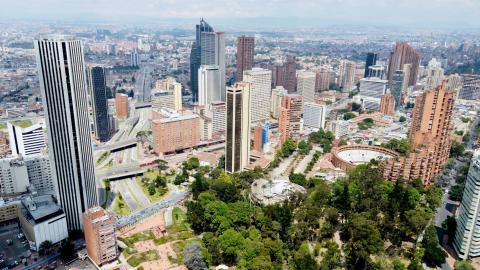
Mining governance matters for a just energy transition
Five lessons on anti-corruption from the 2024 OECD Forum on Responsible Mineral Supply Chains.
The transition towards a renewables-based energy system involves mining for minerals - from copper and cobalt to bauxite and lithium. This is especially true for enabling technologies such as batteries, electric vehicles and transmission networks. At last month’s OECD Forum on Responsible Mineral Supply Chains, discussions underscored the mining industry’s critical role in the energy transition.
We know from past experience that a mining boom could drive an increase in governance and corruption risks in the sector. This could harm communities and the environment and prevent citizens from benefiting from their country’s resource wealth. Fighting corruption needs to be part of efforts to strengthen responsible mineral supply chains for the energy transition.
Within this context, the EITI, REN21, SSE Renewables and Transparency International Australia hosted a roundtable discussion with industry, transparency and human rights NGOs, and intergovernmental organisations, to explore how renewable energy companies can help to address these challenges.
We took away five key messages:
1. Ask the right questions
The “G” of ESG needs to feature more prominently in procurement. Anti-corruption must be part of supply chain due diligence, alongside human rights and environmental protection. Companies should include governance and anti-corruption checks in risk assessments and mitigation measures and engage with their suppliers on these issues. The OECD has provided guidance on how to address bribery and corruption in due diligence. EITI disclosures offer valuable data, highlighting country and company commitments to good governance. Companies can also draw on civil society analysis, such as corruption risk assessments based on tools developed by Transparency International Australia and the Natural Resource Governance Institute and the Business & Human Rights Resource Centre’s Transition Minerals Tracker.
2. Don’t let perfect be the enemy of good
Corruption’s hidden nature and the complexity of mineral supply chains make due diligence challenging. But the difficulty of tracing mineral supplies should not hinder action. Renewable energy companies should build a high-level understanding of their supply chains and map them to the extent possible. Based on this, they can prioritise and mitigate risks and identify areas for further deep-dives, in line with the UN Guiding Principles. Fairphone’s participation in the Fairmined pilot demonstrates how a company can support responsible mineral production even in the absence of full traceability.
3. Embrace collective industry action
The leverage of individual companies to improve performance in their mineral supply chains is often limited. That’s why collective action is urgently needed, as underpinned by the UN Guiding Principles. Renewable energy companies can collaborate with each other, including through industry associations, and link up with efforts in other industries. An example is Drive I Sustainability, an initiative where car companies collaborate to advance social, ethical and environmental performance in automotive supply chains. Building connections along the mineral supply chain, including with commodity traders and mining companies, can further support the push for higher standards.
4. Be transparent
Transparency is essential for enabling scrutiny of a company’s practices. Companies should report their due diligence commitments and risk management efforts. This is an area where much work remains to be done. The 2023 Renewable Energy Benchmark by the Business & Human Rights Resource Centre found that, despite growing commitments to due diligence, none of the reviewed project developers or original equipment manufacturers disclosed their suppliers. In contrast, other sectors have more established transparency practices. For example, the jewellery company Signet discloses its top suppliers through its annual sustainability report.
5. Engage in multi-stakeholder dialogue
Multi-stakeholder dialogue ensures transparency translates into greater accountability. Listening to civil society helps companies identify and mitigate risks. Engaging with governments allows companies to advocate for good governance across the sector, including by pushing for binding regulations that help to build a level playing field of high standards.
Multi-stakeholder action is starting to gather pace. At COP28, a multi-stakeholder coalition issued a call to action for transparency and accountability in the renewable energy sector. In the Netherlands, the International RBC Agreement for the Renewable Energy Sector brings together renewable energy companies, industry associations, the government, knowledge institutions, NGOs and trade unions to strengthen sustainability in renewable energy sector value chains. The Global Battery Alliance brings together diverse stakeholders to support sustainable and responsible battery value chains.
The extractive industries can also offer lessons. The EITI multi-stakeholder groups facilitate engagement between government, industry and civil society on governance and anti-corruption issues in more than 50 countries.
Achieving the COP28 pledge of tripling renewables by 2030 requires reliable and responsibly-sourced mineral supplies. In 2022, a coalition of anti-corruption experts issued a set of recommendations for tackling corruption in mineral supply chains, signalling a growing recognition that good governance is critical to supporting sustainability in the sector. Through their due diligence efforts, renewable energy companies can be part of the solution, ensuring that efforts to scale up renewables help to deliver climate goals and support a just transition for the citizens of resource-rich countries.





